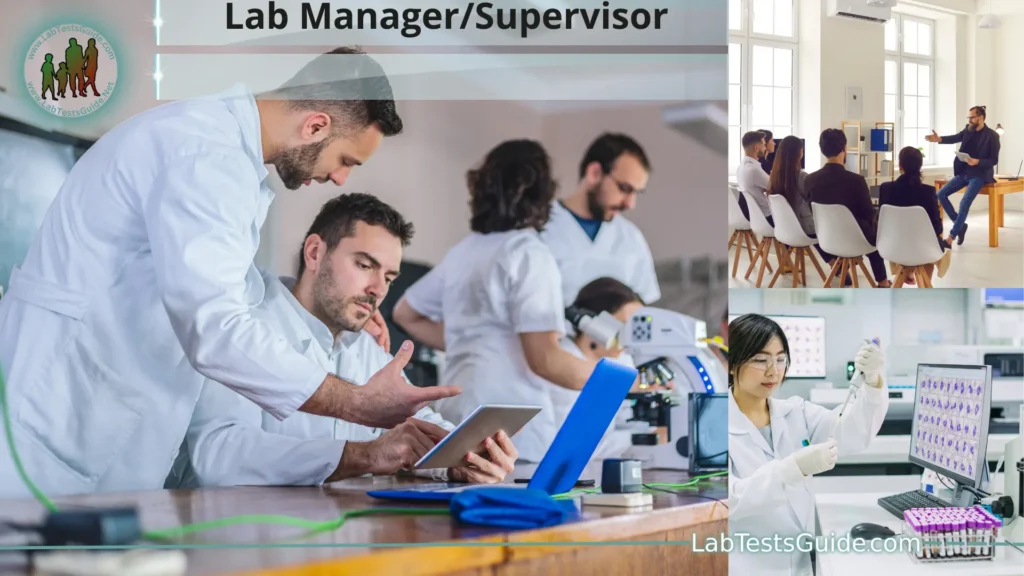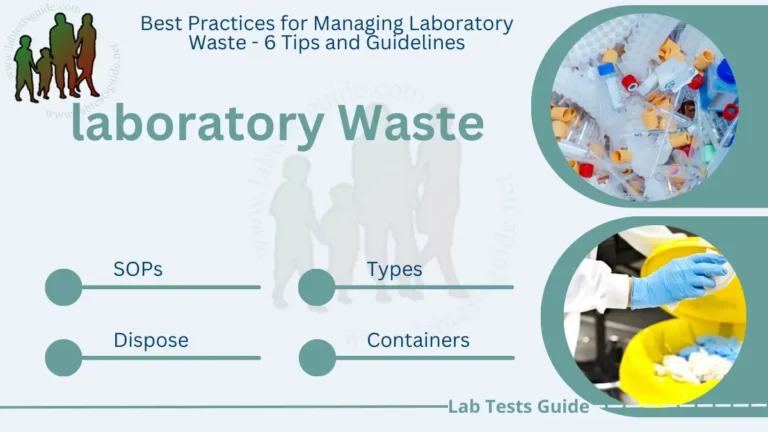A Medical Lab Manager/Supervisor is a professional responsible for overseeing the operations of a medical laboratory. This role requires a combination of technical expertise in laboratory procedures and management skills to ensure the efficient and accurate functioning of the lab.

Discover the vital role of a Medical Lab Manager/Supervisor in healthcare settings. Learn about their responsibilities, qualifications, and the impact they have on maintaining lab efficiency and ensuring accurate medical test results.
Importance of the Medical Lab Manager/Supervisor Role:
The role of a Medical Lab Manager/Supervisor is crucial in healthcare and clinical laboratory settings for various reasons. Here is a list highlighting the importance of this role:
- Quality Assurance: Medical Lab Managers/Supervisors are responsible for ensuring the accuracy and reliability of medical test results, which directly impacts patient diagnosis and treatment.
- Patient Safety: They implement and enforce safety protocols, minimizing the risk of accidents and exposure to hazardous materials for both patients and laboratory staff.
- Compliance and Accreditation: Lab Managers/Supervisors ensure that the laboratory complies with regulatory requirements and meets accreditation standards, which is essential for maintaining the lab’s credibility and legality.
- Efficiency: They oversee the workflow, staffing, and equipment maintenance, optimizing lab operations for faster turnaround times and improved patient care.
- Resource Management: Effective management of laboratory resources, including personnel, equipment, and supplies, helps control costs and maximize the lab’s efficiency.
- Staff Training and Development: Lab Managers/Supervisors provide ongoing training and development opportunities for laboratory personnel, ensuring they stay updated on best practices and new technologies.
- Problem Resolution: They address issues related to quality control, instrumentation, and data management promptly, preventing errors and delays in reporting results.
- Data Integrity: Lab Managers/Supervisors oversee data management processes to maintain accurate records and ensure the security and confidentiality of patient information.
- Continuous Improvement: They identify areas for improvement and implement quality improvement initiatives, leading to better patient outcomes and increased lab performance.
- Regulatory Compliance: Lab Managers/Supervisors keep abreast of changing regulations and guidelines, ensuring that the lab remains compliant and avoids legal and financial penalties.
- Effective Leadership: Their leadership skills motivate and inspire laboratory staff to perform at their best, fostering a positive and productive work environment.
- Interdisciplinary Collaboration: They collaborate with healthcare professionals, including doctors and nurses, to provide valuable insights and support in diagnosing and treating patients.
- Innovation: Lab Managers/Supervisors explore new technologies and methodologies to enhance laboratory capabilities and stay at the forefront of medical testing.
- Emergency Preparedness: They develop and implement emergency response plans to handle unexpected situations, such as outbreaks or natural disasters, ensuring the lab can continue to operate safely.
- Patient Care: Ultimately, the work of a Lab Manager/Supervisor contributes to better patient care by providing accurate and timely diagnostic information that informs medical decisions.
Qualifications and Education:
Qualifications and education requirements for individuals pursuing a career as a Medical Lab Manager/Supervisor typically include a combination of educational degrees, professional certifications, and relevant experience. Here are the key qualifications and educational requirements:
- Educational Background:
- Bachelor’s Degree: A bachelor’s degree in a relevant field is usually the minimum educational requirement. Common majors include Medical Laboratory Science, Clinical Laboratory Science, Biology, Chemistry, or a related scientific discipline.
- Master’s Degree: Some positions, particularly in larger healthcare institutions or academic settings, may prefer or require candidates to hold a master’s degree in Laboratory Management, Healthcare Administration, or a related field.
- Certification:
- Certification as a Medical Laboratory Scientist/Technologist (MLS/MLT): Many employers prefer or require candidates to hold certification from a recognized professional organization, such as the American Society for Clinical Pathology (ASCP), American Medical Technologists (AMT), or other equivalent certifying bodies. Obtaining certification demonstrates competence in laboratory sciences.
- Certification in Laboratory Management: Some candidates pursue additional certifications related to laboratory management, such as the ASCP Certified Specialist in Laboratory Safety (CSLS) or other relevant certifications that focus on quality control and management aspects.
- Experience:
- Laboratory Experience: Candidates typically need several years of practical experience working in a clinical or medical laboratory. This experience helps them gain the technical knowledge and skills required to manage laboratory operations effectively.
- Supervisory Experience: Many positions require candidates to have prior supervisory or managerial experience, demonstrating their ability to lead and oversee laboratory staff.
- Skills:
- Technical Skills: Proficiency in laboratory techniques, instrumentation, and procedures is crucial. Lab Managers/Supervisors should be well-versed in a wide range of laboratory tests and procedures.
- Management Skills: Strong leadership, communication, and interpersonal skills are essential for managing laboratory personnel and fostering a positive work environment.
- Regulatory Knowledge: Knowledge of laboratory regulations, accreditation standards, and compliance requirements is critical for ensuring the lab’s adherence to legal and ethical standards.
- Data Management: Competency in data management, including laboratory information systems (LIS) and electronic health records (EHR), is important for maintaining accurate records and ensuring data security.
- Problem-Solving Abilities: The ability to identify and address issues related to quality control, equipment, and workflow is essential for effective laboratory management.
- Continuing Education:
- Staying updated on advancements in laboratory technology, regulations, and best practices through continuing education and professional development is important for maintaining competence and relevance in the field.
- Regulatory and Compliance Training:
- Lab Managers/Supervisors should receive training and education related to regulatory compliance, including HIPAA, CLIA, CAP, and other relevant standards.
Career Prospects for Lab Manager / Supervisor:
The career prospects for Lab Managers/Supervisors in the field of clinical and medical laboratory management are generally promising. As the healthcare industry continues to evolve and grow, there is a consistent demand for skilled professionals who can manage laboratory operations effectively. Here are some key factors contributing to the positive career outlook for Lab Managers/Supervisors:
- Growing Healthcare Industry: The healthcare sector is expanding due to an aging population, increased healthcare access, and advances in medical technology. This growth leads to an increased need for diagnostic services and medical testing, driving the demand for laboratory professionals.
- Laboratory Accreditation: Accreditation from organizations like the College of American Pathologists (CAP) and the Clinical Laboratory Improvement Amendments (CLIA) is essential for labs. Lab Managers/Supervisors play a critical role in ensuring labs meet accreditation standards, making them invaluable to healthcare organizations.
- Technological Advancements: Ongoing advancements in laboratory technology and automation require skilled professionals to manage and maintain sophisticated equipment and systems. Lab Managers/Supervisors who are well-versed in these technologies are highly sought after.
- Quality Assurance: Ensuring the accuracy and reliability of test results is crucial for patient care. Lab Managers/Supervisors play a pivotal role in implementing and maintaining quality assurance programs, making them indispensable in healthcare settings.
- Regulatory Compliance: Healthcare regulations, including those related to laboratory operations, are continuously evolving. Lab Managers/Supervisors with expertise in compliance and regulatory affairs are in demand to ensure labs operate within legal boundaries.
- Diverse Career Paths: Lab Managers/Supervisors can work in various healthcare settings, including hospitals, clinics, research institutions, pharmaceutical companies, and reference laboratories. This diversity offers opportunities for career advancement and specialization.
- Leadership Opportunities: Many Lab Managers/Supervisors eventually move into higher-level management positions, such as Laboratory Directors or Clinical Laboratory Directors, which come with increased responsibilities and higher earning potential.
- Global Opportunities: The skills and knowledge acquired as a Lab Manager/Supervisor are transferable internationally, providing opportunities to work in different countries or collaborate on global healthcare initiatives.
- Professional Development: Continuous learning and professional development are essential in this field. Lab Managers/Supervisors can pursue advanced degrees, certifications, and training to stay competitive and enhance their career prospects.
- Job Stability: Healthcare is considered a recession-resistant industry, which means that jobs in healthcare, including laboratory management, tend to offer relative job security, even during economic downturns.
Job Description / Responsibilities:
- Laboratory Operations Oversight: Manage and oversee the daily operations of the medical laboratory, ensuring efficient workflow and timely completion of tests.
- Quality Control: Establish and maintain quality control measures to ensure the accuracy and reliability of test results.
- Personnel Management: Supervise and lead laboratory staff, including hiring, training, scheduling, and performance evaluations.
- Budget Management: Develop and manage the laboratory budget, including cost control and resource allocation.
- Regulatory Compliance: Ensure the laboratory complies with all relevant regulatory requirements, including CLIA, CAP, and HIPAA.
- Equipment Maintenance: Oversee the maintenance, calibration, and repair of laboratory equipment and instrumentation.
- Data Management: Ensure the integrity and security of laboratory data, including maintaining accurate records and implementing laboratory information systems (LIS).
- Inventory Management: Manage laboratory inventory, including reagents, supplies, and consumables.
- Safety Protocols: Enforce safety protocols and procedures to protect laboratory personnel and maintain a safe working environment.
- Proficiency Testing: Coordinate and participate in proficiency testing programs to assess the laboratory’s accuracy and reliability.
- Staff Development: Provide training and professional development opportunities to laboratory personnel to enhance their skills and knowledge.
- Problem Resolution: Investigate and address quality control issues, equipment malfunctions, and other operational challenges.
- Accreditation Preparation: Prepare the laboratory for accreditation inspections, ensuring compliance with accreditation standards.
- Data Analysis: Analyze and interpret laboratory data, troubleshoot issues, and recommend corrective actions.
- Interdisciplinary Collaboration: Collaborate with healthcare professionals to provide expertise on laboratory testing and results interpretation.
- Emergency Preparedness: Develop and implement emergency response plans to ensure the continuity of laboratory operations during emergencies or disasters.
- Reporting and Documentation: Prepare reports on laboratory performance, quality metrics, and budget expenditures for senior management.
- Continuous Improvement: Identify areas for improvement in laboratory processes and implement quality improvement initiatives.
- Inventory Procurement: Procure and evaluate laboratory supplies, equipment, and reagents, and recommend purchases as needed.
- Ethical and Legal Compliance: Ensure ethical conduct and legal compliance in all laboratory activities, including the handling of patient information and specimens.







One Comment